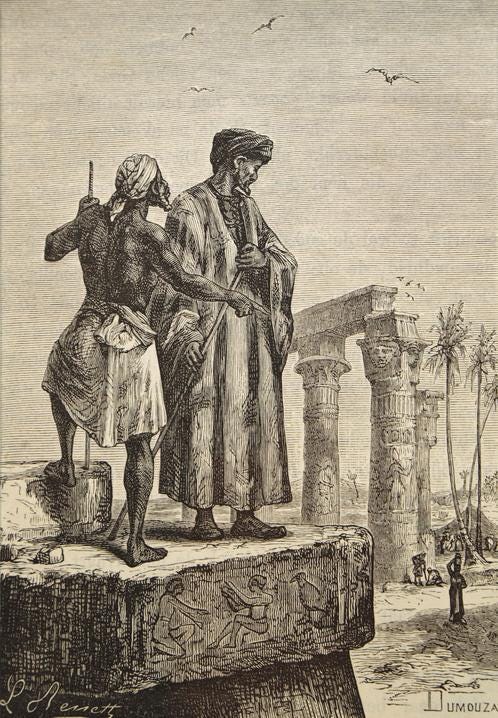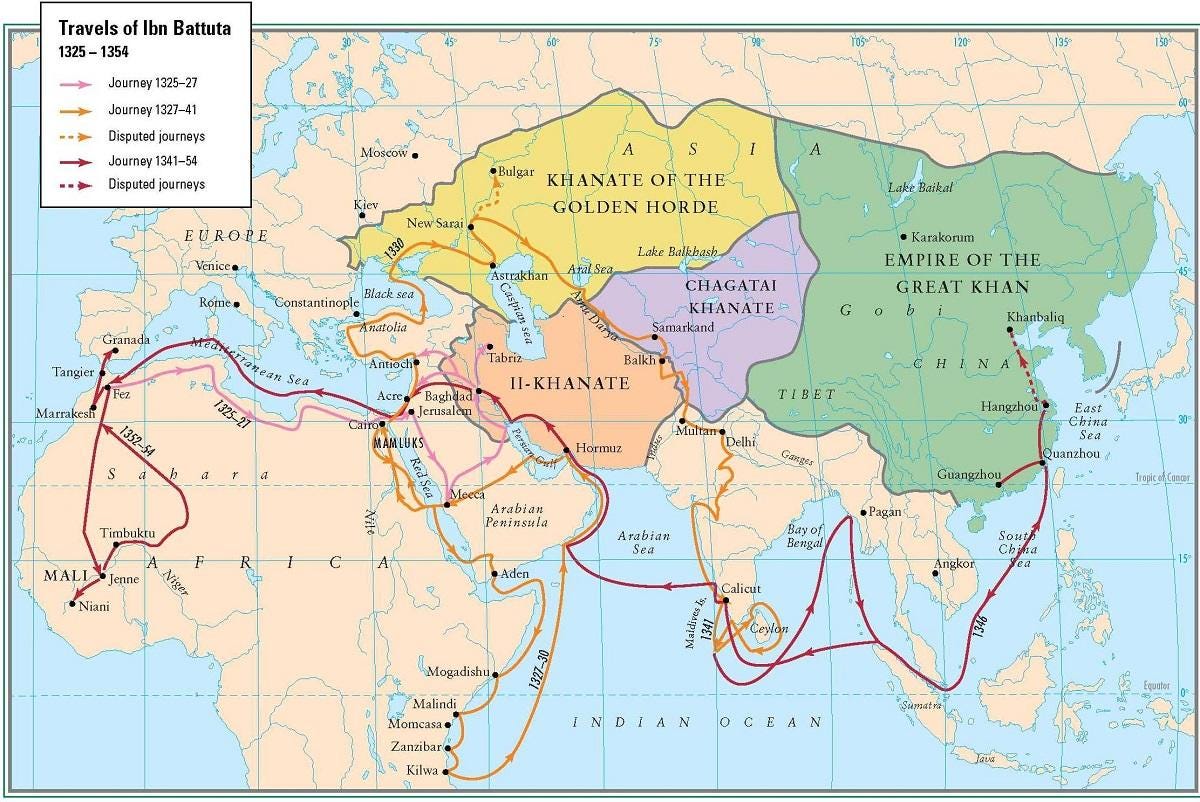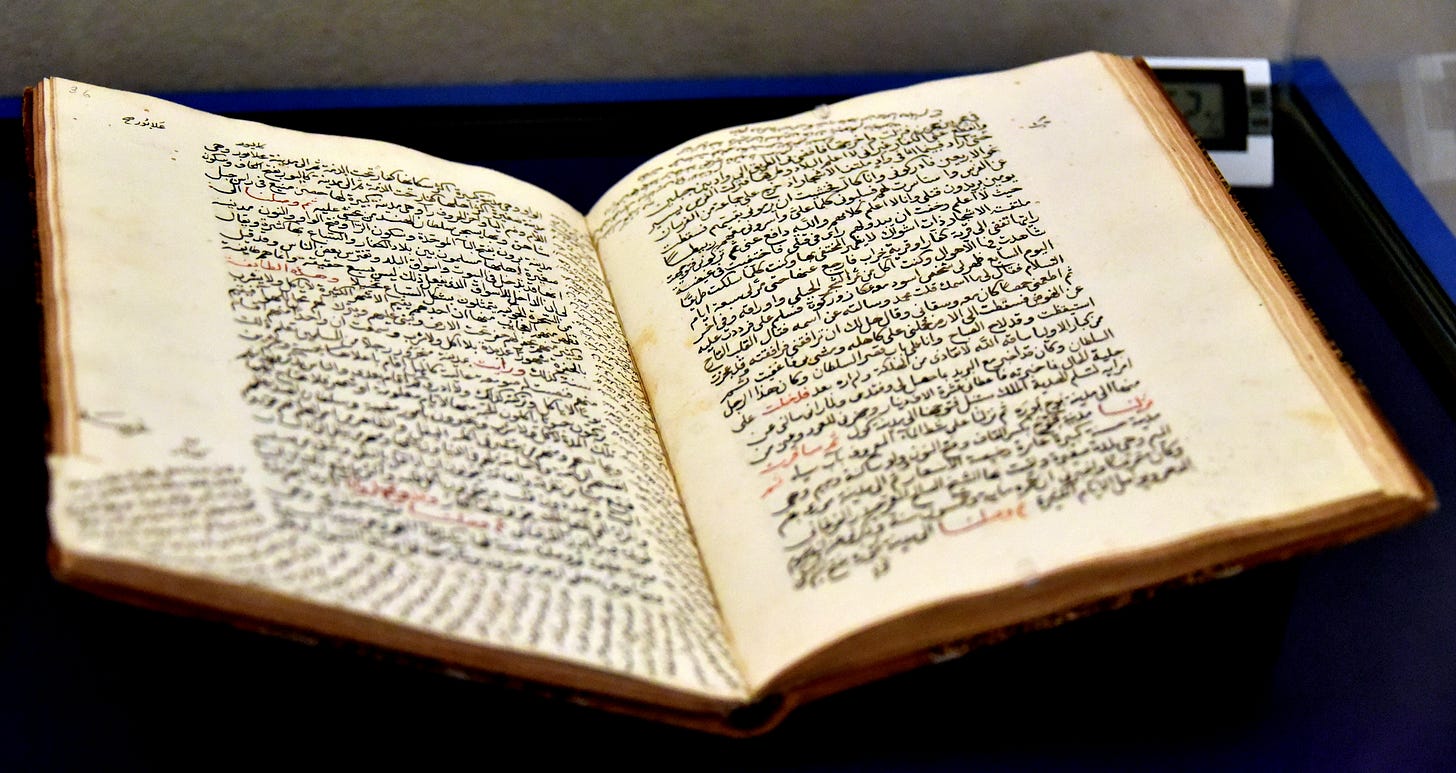Compass Dispatch: The 700th Anniversary of one of history's greatest adventures
Ibn Battuta turned his gap year into a 30-year journey across three continents (and we don’t talk about it enough)
Good morning, commitment-phobic wanderers, gap-year graduates who've been "finding themselves" for suspiciously long periods, and anyone who's ever told their parents they're "just popping to the shops" and returned three weeks later with questionable explanations and a suspicious tan.
Today marks a rather special anniversary in the annals of travel plans gone magnificently awry. On June 13, 1325, a young man known to history as Ibn Battuta casually mentioned to his family that he was heading to Mecca for a quick pilgrimage. Standard religious obligation, really. A year, maybe two at most.
Thirty years later, this absolute madman finally rocks up back home having visited almost everywhere that would have constituted "the known world" for medieval Muslims. Young Ibn Battuta had managed to transform what should have been essentially a gap year in his studies into one of the most extraordinary journeys ever recorded.
Ibn Battuta's travel credentials are frankly absurd. On his journeys, he encountered holy men and con artists, thieves and sultans, pilgrims and fellow travelers who probably wished they'd chosen different traveling companions. He traversed seemingly impassable deserts and crossed oceans in wooden boats held together with rope, prayers, and what we can only assume was considerable optimism. He had sufficient narrow escapes to rival Indiana Jones and was marooned more times than the entire cast of Survivor: All Stars.
Along the way, he managed to serve as a judge in medieval India, make two separate trips to sub-Saharan Africa, and meet the Mongol Khan in today’s Beijing. He also found time to get married—depending on your source, between seven and ten times —which suggests either remarkable romantic optimism or a fundamental misunderstanding of the logistics involved in maintaining long-distance relationships.
If you're doing the math, his travels span approximately 75,000 miles, encompassing 44 modern countries and three continents. For context, that's roughly three times around the Earth at the equator.
When Ibn Battuta finally returned home to Tangiers in Morocco three decades after he'd set out, he dictated an account of his voyages to a court scholar, leaving behind what is essentially the medieval world's most comprehensive travel blog. His Rihla (short title: "The Journey") provides an invaluable record not only of travel, but also of what the 14th-century world actually looked like to someone who had seen most of it firsthand.
Unlike Marco Polo, who focused primarily on the exotic wonders of the East, Ibn Battuta documented the everyday realities of medieval Islamic civilization across three continents. His accounts include everything from local customs and political situations to food, architecture, and the generosity and quality of various hosts, which in several instances makes him seem like he’s writing medieval Airbnb reviews.
(I like the sultan’s palace, but the food options were limited to…porridge? Banana gruel? Definitely won’t be staying here again…)
What makes Ibn Battuta particularly remarkable is that he achieved all this using the medieval equivalent of a very good university degree as his primary credential. His education in Islamic law served as a kind of passport, opening doors from Morocco to China because legal expertise was universally valued across the Islamic world. It's rather like having a PhD from Oxford—it gets you into exclusive clubs everywhere, even if people can't quite place your accent.
His journey reveals a medieval world that was far more connected and cosmopolitan than popular imagination suggests. The 14th century had established trade routes, international scholarly networks, and diplomatic relations that allowed someone with the right qualifications and sufficient determination to travel from Atlantic Morocco to the South China Sea—admittedly with considerably more risk of death by plague, bandits, or monsoon than modern travelers face.
A Seven-Century-Old Lesson in Wanderlust
Today, as we commemorate the 700th anniversary of what began as a simple pilgrimage and evolved into history's most comprehensive medieval travel adventure, perhaps we should tip our hats to Ibn Battuta's magnificent example of how the best journeys often bear no resemblance to the original itinerary.
May your own travels be less arduous than Ibn Battuta's but no less transformative. And perhaps, when you tell your family you're just popping out for a quick trip, you might want to be a bit more specific about your expected date of return.
—The By Their Own Compass Team
If you’re looking for the tl;dr version, here’s a short video take from Jeremiah:
If this newsletter inspired you to appreciate the convenience of modern transportation, do share it with someone who thinks a delayed train is the height of travel inconvenience. They might benefit from learning what actual adventure used to require.






